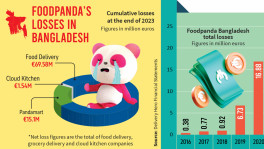Fiery March
March of 1971 was a historical month for the nation of Bangladesh and the Bangladeshi people. By delving into the depth of the history, we take a look at why.

March is an eventful month for Bangladesh. It was in this month Bangabandhu Sheikh Mujibur Rahman gave the speech that inspired millions of Bengalis to fight for a country of their own. His speech has been included in the world register as a heritage document by UNESCO in 2017.
Bangabandhu's 7 March speech created the foundation on which we declared ourselves independent. It was on the 26 of March of 1971 when Bangladesh began its War of Liberation. There were many reasons why Bengalis wanted their freedom from the atrocious ruling military regime and many authors, historians and analysts have examined our war from many aspects and penned volumes.
This piece tries to take a look at a few of those valuable records of history. Maidul Hasan's Muldhara Ekattor (1986) published by UPL points out that the main reasons for the war were the differences in the way of life, culture and geography of the two Pakistans. The people of the eastern wing of Pakistan had a different language and a different history than the west. Secondly, the two wings were 1400 miles of landmass apart and the leaders were unable to develop any strategy that would keep the peoples of the two wings together. And thirdly, the oppression of the west from the very beginning of Pakistan's creation. So much so that at one point in time, it became inevitable to break free from Pakistan.
Historian and social analyst Afsan Chowdhury has stated in a recent essay in Pakistan ki adou kono rastro chilo (1948-1971)? in Kaler Kheya (12 March 2021) that the birth of Pakistan by Mohammad Ali Jinnah was, in fact, faulty from the beginning. Had it been not that, then the state of Pakistan would have lasted many more years than just 24. On the other hand, the Pakistan of Yahia Khan continues to live on today for more than 50 years.
This part of the South Asian subcontinent has always been less developed even before the time of the partition in 1947. The zamindars were given power and titles to rule a certain part of the country. They earned a lot of money from the poor people who lived in their territory. They were mostly Hindus and lived in the city of Kolkata, whereas most people residing here were Muslim peasants with little or no land of their own.
When Pakistan was formed, the leaders of the country treated the people of erstwhile East Pakistan as lesser humans. Our language was ignored and it was proclaimed that Urdu would become the state language of Pakistan even though 56% of the country spoke Bangla. Hence followed the uprising of 1952 where upholders of the Bangla language gave their lives demanding Bangla to be the state language.
After that, there were a series of such uprisings - in 1969, 1970 and finally in 1971.
When India and Pakistan were divided into two countries, East Bengal became a part of Pakistan and was called East Pakistan. The west and east Pakistan were together based on religion. Other than that, the people of the two wings had shared nothing. Muslims living here had a culture that was shared with Hindus for aeons. That gave them a new creed of being Bengali-Muslims. The Bengali identity came to light.
Years ago, scholar-politician Maulana Abul Kalam Azad wrote that Muslims all over the world have only one identity: that they are Muslims. That was 30 years before the birth of Pakistan. Maulana Azad didn't know that a separate country for the Muslims would be formed. So, when East Bengal became East Pakistan, the people were unhappy with the treatment they received from the west. Bangabandhu Sheikh Mujibur Rahman won a landslide victory in the general election of '70. But the ruling government was not willing to allow his party to form the government. So the people started revolting.
As I was saying that March is an eventful month for us, Bengalis were already on the road to independence. On 2 March, student activists had already flown the flag of independent Bangladesh with a map of Bangladesh in gold inside the red circle at the University of Dhaka. In the book Ami Sirajul Alam Khan by Shamshuddin Peyara, it is written that 22 members took part in making the flag and later it was handed over to Bangabandhu Sheikh Mujibur Rahman by ASM Abdur Rob. The manifesto of Independence was read out on 2 March by the General Secretary of Chatro League Shahjahan Siraj. Amar sonar Bangla/Ami tomai bhalobhashi was also chosen as the national anthem by Sirajul Alam Khan on the same night.

On 7 March, Bangabandhu gave a clarion call to the people of East Pakistan to put up a non-cooperation movement against the Pakistani government and to fight them with whatever weapons they had. The ruling party planned a blueprint for destroying the nation by running a killing mission called Operation Searchlight on 25 March. The army killed unarmed people and it went on for 33 hours non stop. Rajarbagh, Pilkhana, Chattogram, Cumilla and Jashore cantonments were ambushed and many were killed.
Bangabandhu was arrested on the same night but not before he had sent the message of independence across the country.
The next day, Awami League leader Mr Hannan declared independence from Biplobi Swadhin Bangla Betar Kendro in Kalurghat. On the next day, on 27 March, Major Zia, one of the sector commanders of our liberation also announced independence from the same place on behalf of Bangabandhu.
In the meantime, thousands of people began fleeing the atrocities committed by the Pakistani army. First, they moved to the villages, then to the border and refugee camps in neighbouring India. The Bengali members of the East Bengal Regiment and East Pakistan Rifles built up resistance with the locals forming the Mukti Bahini.
The members of Mukti Bahini were trained by the Indian army and were provided with the ammunition to fight with. This led to the meeting of all the commanders of the Liberation War with the commander-in-chief General Ataul Ghani Osmani at Telipara Tea Garden on 4 April.
Later the Swadhin Bangla Betar Kendro went on air in Kolkata. The idea of the formation of the first government in Mujibnagar was also formulated after most of our leaders reached Kolkata.
That was the month of March in 1971.
March is, you see, indeed, very significant for us. I should also mention that the leader of our war of liberation was born on 17 March, in Tungipara, who later became the Father of the Nation.
Jackie Kabir is a writer and translator.


 Keep updated, follow The Business Standard's Google news channel
Keep updated, follow The Business Standard's Google news channel
















